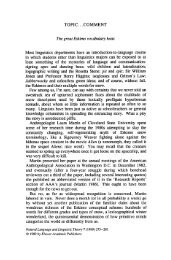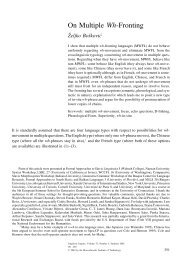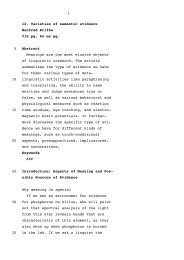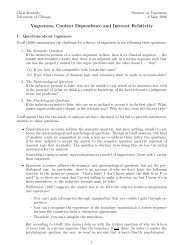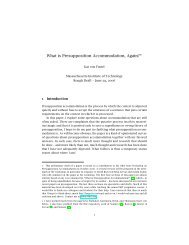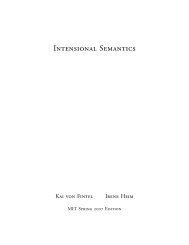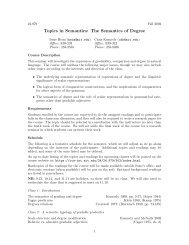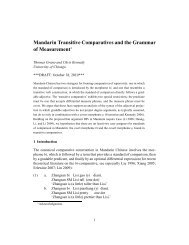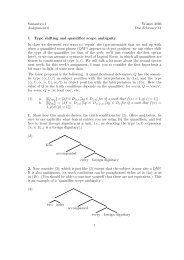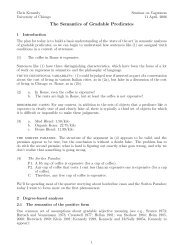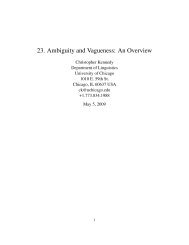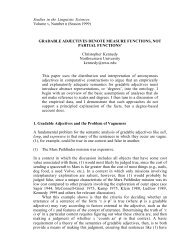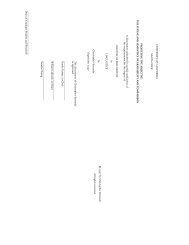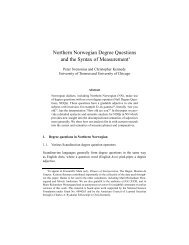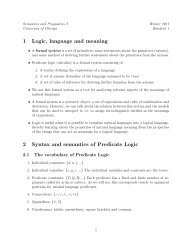On the natural history of negative polarity items - Syntax, Semantics ...
On the natural history of negative polarity items - Syntax, Semantics ...
On the natural history of negative polarity items - Syntax, Semantics ...
Create successful ePaper yourself
Turn your PDF publications into a flip-book with our unique Google optimized e-Paper software.
Hedde Zeijlstra<br />
What is right to say about light negation?<br />
As has been observed by Schwarz (2004) and Schwarz & Bhatt (2008), inclusion <strong>of</strong> a<br />
<strong>negative</strong> marker like German nicht in front <strong>of</strong> indefinite or definite DPs, as in (1), renders a<br />
sentence ill-formed:<br />
(1) a. Fritz kann (*nicht) eine Fremdsprache.<br />
Fritz knows not a foreign language<br />
b. Fritz hat (*nicht) Frage 3 beantwortet.<br />
Fritz has not question 3 answered<br />
Remarkably, such <strong>negative</strong> constructions are, however, fine, once <strong>the</strong>y are embedded in NPI<br />
licensing contexts; e.g. <strong>the</strong> interrogative version <strong>of</strong> (1a) is fine:<br />
(1) c. Kann Fritz nicht eine Fremdsprache?<br />
Fritz knows not a foreign language<br />
The question is whe<strong>the</strong>r <strong>the</strong> facts in (1) are due to <strong>the</strong> fact that nicht here is a special NPI,<br />
dubbed light negation, homophonous to <strong>the</strong> <strong>negative</strong> marker (as has been proposed by<br />
Ladusaw 1979, Schwarz 2004 and Schwarz & Bhatt 2008), or whe<strong>the</strong>r <strong>the</strong> <strong>negative</strong> marker is<br />
a regular negation in (1) and (2) and some o<strong>the</strong>r mechanism is responsible for <strong>the</strong><br />
ungrammaticality <strong>of</strong> <strong>the</strong> sentences in (1). In this paper I explore <strong>the</strong> latter approach,<br />
hypo<strong>the</strong>sizing that all cases currently analyzed as light negation involve in fact regular<br />
negation and that <strong>the</strong> ungrammaticality <strong>of</strong> <strong>the</strong> examples in (1) results from particular<br />
pragmatic inferences. Let's first focus on (1a) and assume that <strong>the</strong> underlying structure <strong>of</strong> (1a)<br />
is as in (2a), where nicht c-commands eine Fremdsprache; negation thus scopes over <strong>the</strong><br />
indefinite DP:<br />
(2) [Frits kann [nicht [eine Fremdsprache]]] [¬ > [! NP]]<br />
For most scholars, <strong>the</strong> syntactic structure in (2) is different from <strong>the</strong> structure <strong>of</strong> sentence<br />
containing a regular <strong>negative</strong> indefinite (such as (3)).<br />
(3) Frits kann keine Fremdsprache<br />
Fritz knows no foreign language<br />
For some a <strong>negative</strong> indefinite is a <strong>negative</strong> quantifier <strong>of</strong> some sort (Geurts 1999, De Swart<br />
2000, Abels & Marti 2010); o<strong>the</strong>rs take it to be lexically decomposed into a negation and a<br />
non-<strong>negative</strong> indefinite (Jacobs 1980, Rullman 1995, Zeijlstra 2011). Finally, Penka (2010)<br />
takes it to be a non-<strong>negative</strong> indefinite that needs to stand in an agreement relation with an<br />
abstract <strong>negative</strong> operator. Under <strong>the</strong> view that <strong>negative</strong> indefinites are <strong>negative</strong> quantifiers,<br />
as well as for Zeijlstra (2011), <strong>the</strong> syntactic structure <strong>of</strong> <strong>the</strong> sentence containing keine is as in<br />
(2b), where a <strong>negative</strong> indefinite takes <strong>the</strong> NP as its complement. For Jacobs (1980), Rullman<br />
(1995) and Penka (2010) (3) is ambiguous between [¬ > [! NP]] and [[¬ > !] > NP].<br />
(4) Frits kann [keine [Fremdsprache]] [[¬ > !] > NP]<br />
Adopting <strong>the</strong> former approach, it now follows that (1a) and (3) exhibit different scopal<br />
relations between <strong>the</strong> negation, <strong>the</strong> indefinite and <strong>the</strong> NP. Moreover, replacing nicht + eine by<br />
keine in (1a) results in a good sentence (3). Since keine is a single morphological word and<br />
nicht eine is not, it also makes good sense to assume that nicht eine is marked w.r.t. keine.<br />
Following Horn's (1984, 1989) division <strong>of</strong> pragmatic labour, unmarked expressions are<br />
generally used to convey unmarked messages and marked expressions are generally used to<br />
convey marked messages. Applying this to (1a) and (3), this means that it can be inferred that<br />
a speaker uttering (1a) does not want to convey <strong>the</strong> meaning <strong>of</strong> (3). However, this yields a<br />
contradiction: <strong>the</strong> speaker wants to convey that Fritz does not know a foreign language, but at<br />
<strong>the</strong> same times <strong>the</strong> speaker does not want to convey that Fritz knows no foreign language.<br />
This is what explains that ill-formdeness <strong>of</strong> (1a): uttering a construction that contains light<br />
negation gives rise to a conversational implicature that contradicts it.<br />
This analysis makes a number <strong>of</strong> predictions. First, since sentences like (1a) have<br />
syntactic structure [¬ > [! NP]], (1a) should be fine with a reading which is not yielded by<br />
(3). This is indeed correct. (1a), if properly modified, is fine with a reading where <strong>the</strong>



